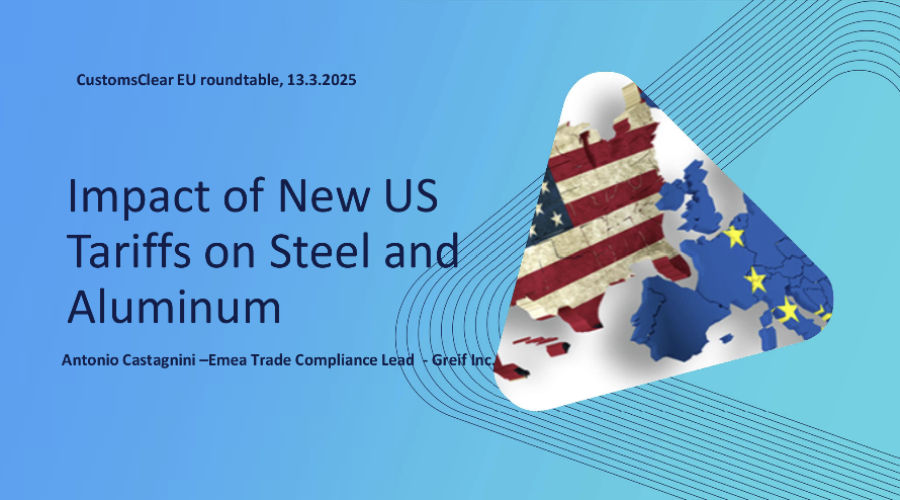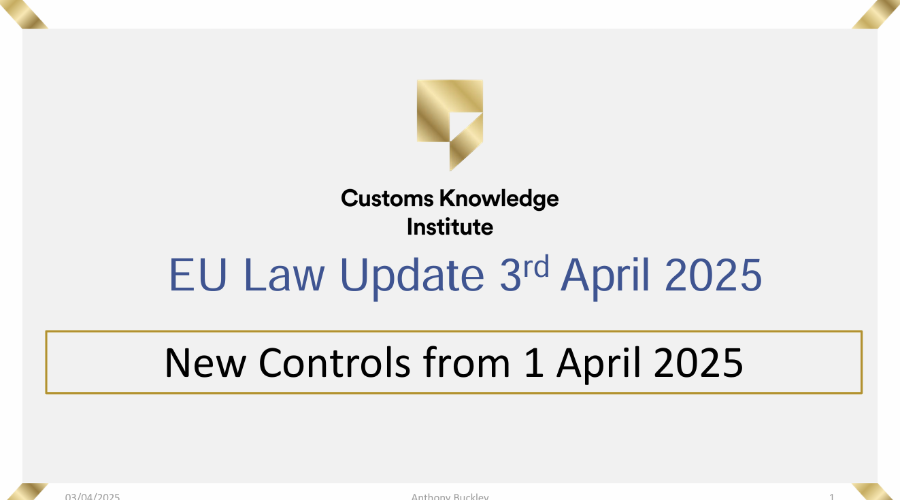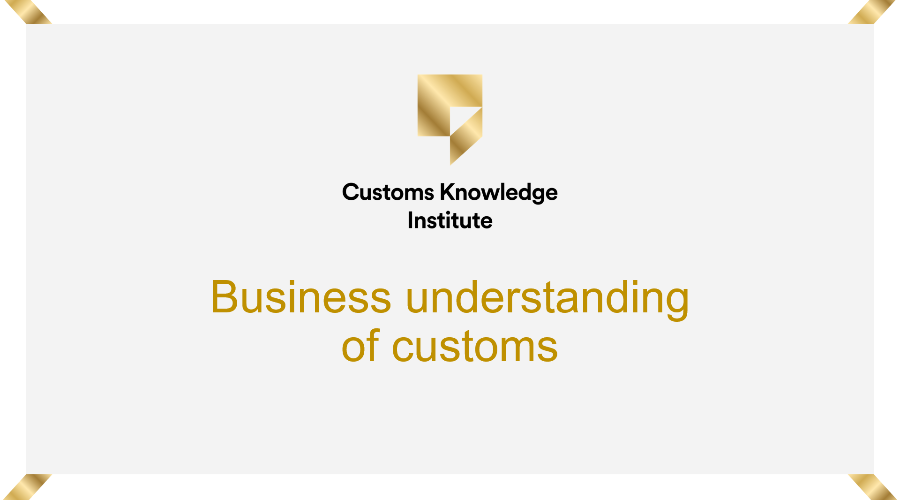Featured content
EU customs and trade news: April 2025
News in week 16: in response to renewed US tariffs, the EU is reintroducing its own countermeasures; EU's countermeasures suspended for 90 days; Access2Markets – update of the new US tariffs; … EU eases EUDR compliance; digital product passports - EU’s ecodesign roadmap announced; Council adopts ‘Stop-the-clock’ directive, a key part of the EU’s legislative simplification efforts; imports of certain rainbow trout subject to registration; Commission recommendation on coordination of national control lists; third countries align with EU sanctions on Belarus; revised EU arms export control framework; Commission Safety Gate Report 2024 - key points; and more updates.
EU customs and trade news: April 2025
News in week 16: in response to renewed US tariffs, the EU is reintroducing its own countermeasures; EU's countermeasures suspended for 90 days; Access2Markets – update of the new US tariffs; EU eases EUDR compliance; digital product passports - EU’s ecodesign roadmap announced; Council adopts ‘Stop-the-clock’ directive, a key part of the EU’s legislative simplification efforts; imports of certain rainbow trout subject to registration; Commission recommendation on coordination of national control lists; third countries align with EU sanctions on Belarus; revised EU arms export control framework; Commission Safety Gate Report 2024 - key points; and more updates.
Articles
EU customs and trade news: April 2025
News in week 16: in response to renewed US tariffs, the EU is reintroducing its own countermeasures; EU's countermeasures suspended for 90 days; Access2Markets – update of the new US tariffs; … EU eases EUDR compliance; digital product passports - EU’s ecodesign roadmap announced; Council adopts ‘Stop-the-clock’ directive, a key part of the EU’s legislative simplification efforts; imports of certain rainbow trout subject to registration; Commission recommendation on coordination of national control lists; third countries align with EU sanctions on Belarus; revised EU arms export control framework; Commission Safety Gate Report 2024 - key points; and more updates.
EU customs and trade news: April 2025
News in week 16: in response to renewed US tariffs, the EU is reintroducing its own countermeasures; EU's countermeasures suspended for 90 days; Access2Markets – update of the new US tariffs; EU eases EUDR compliance; digital product passports - EU’s ecodesign roadmap announced; Council adopts ‘Stop-the-clock’ directive, a key part of the EU’s legislative simplification efforts; imports of certain rainbow trout subject to registration; Commission recommendation on coordination of national control lists; third countries align with EU sanctions on Belarus; revised EU arms export control framework; Commission Safety Gate Report 2024 - key points; and more updates.
What is your risk profile with customs?
This article looks at how your business activities, trading relationships, internal controls, and interactions with customs and other authorities can impact your risk assessment and, in turn, … the extent of customs controls. It also offers practical insights into how companies can lower their customs risk profile and reduce the level of scrutiny customs authorities apply to their operations.
Boryana Peycheva
What is your risk profile with customs?
This article looks at how your business activities, trading relationships, internal controls, and interactions with customs and other authorities can impact your risk assessment and, in turn, the extent of customs controls. It also offers practical insights into how companies can lower their customs risk profile and reduce the level of scrutiny customs authorities apply to their operations.
Boryana Peycheva
Export control: where do we start?
In this continuation of the export control series, we place ourselves in the position of a company expanding internationally and taking initial steps towards implementing export control procedures. … In such instances, where no export control department or organisational structure yet exists, the question arises: who should assume responsibility for this crucial function?
Sabine van Osenbrüggen
Export control: where do we start?
In this continuation of the export control series, we place ourselves in the position of a company expanding internationally and taking initial steps towards implementing export control procedures. In such instances, where no export control department or organisational structure yet exists, the question arises: who should assume responsibility for this crucial function?
Sabine van Osenbrüggen
Can the EU strike a balance between worker protection, innovation and global AI competitiveness?
Editor's note: Continuing the theme of the previous article (see 'Discussion of the most important AI risks'), the author looks at how the EU is trying to reconcile worker protection, innovation … and global AI competitiveness while taking full account of citizens' concerns. The author discusses a recent opinion of the European Economic and Social Committee (EESC) and shares his findings.
Dr Ramūnas Šablinskas
Can the EU strike a balance between worker protection, innovation and global AI competitiveness?
Editor's note: Continuing the theme of the previous article (see 'Discussion of the most important AI risks'), the author looks at how the EU is trying to reconcile worker protection, innovation and global AI competitiveness while taking full account of citizens' concerns. The author discusses a recent opinion of the European Economic and Social Committee (EESC) and shares his findings.
Dr Ramūnas Šablinskas
Videos
Courses
Glossary
Pan-European-Mediterranean (PEM) Zone
The Pan-European-Mediterranean Zone was implemented in 2005. The idea was to create a cumulation zone between Europe and its neighbours and to encourage intra-regional integration by promoting … trade and cooperation. The PEM Convention allows for the cumulation of origin between different countries within the zone. Cumulation of origin is one of the ways to allow for greater flexibility when it comes to using raw and semi-manufactured materials in the production process. It allows a member of a trade agreement to use originating products from other members.
Pan-European-Mediterranean (PEM) Zone
The Pan-European-Mediterranean Zone was implemented in 2005. The idea was to create a cumulation zone between Europe and its neighbours and to encourage intra-regional integration by promoting trade and cooperation. The PEM Convention allows for the cumulation of origin between different countries within the zone. Cumulation of origin is one of the ways to allow for greater flexibility when it comes to using raw and semi-manufactured materials in the production process. It allows a member of a trade agreement to use originating products from other members.
Environmental, Social and Governance (ESG)
ESG stands for Environmental, Social and Governance, which are considered the three main pillars of ESG frameworks. These pillars cover key areas that companies must address and report on. The … purpose of ESG is to identify and consider non-financial risks and opportunities associated with a company's day-to-day operations.
Environmental, Social and Governance (ESG)
ESG stands for Environmental, Social and Governance, which are considered the three main pillars of ESG frameworks. These pillars cover key areas that companies must address and report on. The purpose of ESG is to identify and consider non-financial risks and opportunities associated with a company's day-to-day operations.





